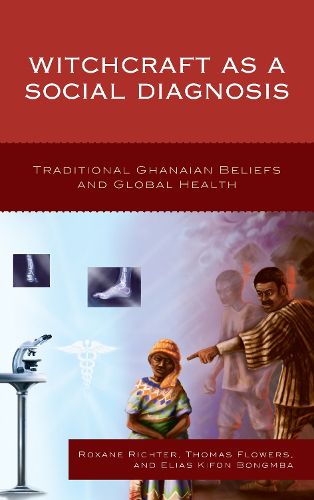Readings Newsletter
Become a Readings Member to make your shopping experience even easier.
Sign in or sign up for free!
You’re not far away from qualifying for FREE standard shipping within Australia
You’ve qualified for FREE standard shipping within Australia
The cart is loading…






This interdisciplinary manuscript examines one nonprofit’s five years of medical outreach in the condemned witches village of Gnani in Ghana, focusing on the clashes between traditional Ghanaian beliefs, African religious tenets, and contemporary Western medical science. The research draws upon 1,714 patient interventions and 95 personal interviews, exposing the inherent challenges of separating indigenous beliefs surrounding fate and witchcraft convictions from contemporary interpretations of biological pathogens, structural and gender-based violence, and evidence-based medicine.
This book offers a novel perspective on witchcraft as it examines questions of stigmatization in order to extrapolate how disease, injury, and illness relate to social condition and the dialogue surrounding witchcraft. These unprecedented insights will serve to uncover and explore rural Ghanaian challenges in gender-based violence, religion, legal and political tenets, human rights, and medical science and their many implications for those in search of health parity, social justice, gender equity, and human rights.
$9.00 standard shipping within Australia
FREE standard shipping within Australia for orders over $100.00
Express & International shipping calculated at checkout
This interdisciplinary manuscript examines one nonprofit’s five years of medical outreach in the condemned witches village of Gnani in Ghana, focusing on the clashes between traditional Ghanaian beliefs, African religious tenets, and contemporary Western medical science. The research draws upon 1,714 patient interventions and 95 personal interviews, exposing the inherent challenges of separating indigenous beliefs surrounding fate and witchcraft convictions from contemporary interpretations of biological pathogens, structural and gender-based violence, and evidence-based medicine.
This book offers a novel perspective on witchcraft as it examines questions of stigmatization in order to extrapolate how disease, injury, and illness relate to social condition and the dialogue surrounding witchcraft. These unprecedented insights will serve to uncover and explore rural Ghanaian challenges in gender-based violence, religion, legal and political tenets, human rights, and medical science and their many implications for those in search of health parity, social justice, gender equity, and human rights.